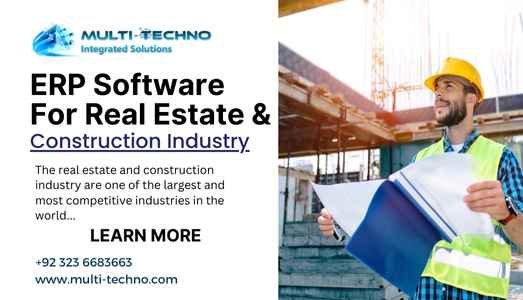The real estate and construction industry are one of the largest and most competitive industries in the world. It requires seamless coordination between multiple departments and stakeholders to ensure the successful completion of projects. The traditional manual methods of managing projects have become insufficient and time-consuming, and that’s why many companies are now turning to ERP (Enterprise Resource Planning) software.
An ERP solution helps organizations streamline their processes, reduce manual workloads, and increase efficiency. In the real estate and construction industry, an ERP system is essential to manage everything from project planning to construction, finance, and property management. In this article, we will explore how an ERP solution can benefit the real estate and construction industry and what to look for when choosing ERP software.
What is ERP Software?
An ERP software system is an integrated software platform that automates and streamlines all the essential business processes of an organization. An ERP system integrates multiple applications, such as accounting, human resources, procurement, and project management, into a single software solution. This integration enables real-time data exchange between departments and provides a complete picture of the organization’s business operations.
Benefits of ERP Software for the Real Estate & Construction Industry
Improved Project Management
ERP software provides real-time information on project status, resources, and schedules. This information can be used to track project progress, identify potential risks, and make informed decisions. An ERP system also enables collaboration between different departments, such as construction and finance, to ensure that projects are completed within budget and on time.
Increased Efficiency
ERP software reduces manual workloads and increases efficiency by automating many business processes, such as invoicing, procurement, and inventory management. This enables organizations to focus on their core business activities and reduces the risk of errors. An ERP system also provides real-time information on the availability of resources and helps organizations make informed decisions about resource allocation.
Better Financial Management
An ERP system provides real-time financial information, including accounts payable, accounts receivable, and cash flow. This information can be used to track expenses and make informed decisions about financial management. An ERP system also integrates with accounting software, such as QuickBooks, to provide a complete picture of the organization’s financial status.
Improved Customer Relationship Management
ERP software provides a centralized database of customer information, including contact information, project history, and customer interactions. This information can be used to manage customer relationships and improve customer service. An ERP system also integrates with CRM (Customer Relationship Management) software to provide a complete view of customer interactions and to improve sales and marketing efforts.
Enhanced Property Management
An ERP system provides real-time information on property availability, rent, and maintenance. This information can be used to manage properties effectively and to make informed decisions about property management. An ERP system also integrates with property management software to provide a complete view of property information and to automate property management processes.
What to Look for When Choosing an ERP Software for Real Estate & Construction Industry
Integration
An ERP system must be able to integrate with other software solutions, such as accounting and project management software. This integration enables real-time data exchange and provides a complete picture of the organization’s business operations.
Customizability
An ERP system must be customizable to meet the unique requirements of the real estate and construction industry. This customization can include the addition of new modules, such as property management, and the customization of existing modules, such as project management.
User-friendly Interface
The ERP system must have a user-friendly interface that is easy to navigate and use. This will reduce the learning curve for employees and increase productivity. The ERP system should also provide real-time data and dashboards to enable users to make informed decisions.
Mobile Accessibility
In today’s fast-paced business environment, it is essential that employees have access to real-time information from anywhere, at any time. An ERP system must provide mobile accessibility so that employees can access the system from their smartphones or tablets. This will improve productivity and enable employees to make informed decisions, even when they are on the go.
Scalability
The ERP system must be scalable to meet the growing needs of the organization. This scalability can include the addition of new modules, the integration of new software solutions, and the addition of new users.
Technical Support
An ERP system is a critical component of an organization’s business operations, and it is essential that it is reliable and supported by a competent technical team. The ERP software vendor must provide 24/7 technical support to ensure that any issues are resolved quickly and effectively.
Cost-effectiveness
The ERP system must be cost-effective and provide a good return on investment. The ERP System vendor should offer flexible pricing options, including cloud-based solutions, which are often more cost-effective than on-premise solutions.
Conclusion
An ERP software solution is essential for organizations in the real estate and construction industry to manage their business operations effectively. The benefits of an ERP system include improved project management, increased efficiency, better financial management, improved customer relationship management, and enhanced property management.
Book Your Online Free Demo Now https://multi-techno.com/contact-us/
When choosing an ERP software solution, organizations must consider factors such as integration, customizability, user-friendly interface, mobile accessibility, scalability, technical support, and cost-effectiveness. With the right ERP software solution, organizations in the real estate and construction industry can improve their business operations, increase efficiency, and stay ahead of the competition.




